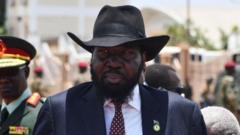South Sudan has condemned the US government's blanket visa ban on its citizens, arguing that it stems from a case of mistaken nationality regarding a deported individual. The US cites South Sudan's reluctance to accept deported citizens as the reason for the ban, despite the South Sudanese government asserting the individual in question was from the Democratic Republic of Congo.
South Sudan Decries US Visa Ban as Misguided Response to National Identity Error

South Sudan Decries US Visa Ban as Misguided Response to National Identity Error
The South Sudan government claims the US visa ban results from a mistaken identity case involving a Congolese citizen, not a South Sudanese national.
South Sudan has expressed strong discontent over the recent US visa ban affecting all its nationals, stating that the decision was based on a misinterpretation concerning a citizen of another African nation. The US Secretary of State, Marco Rubio, announced the visa restrictions on Saturday, criticizing South Sudan for failing to accept citizens being deported from the US. In response, the South Sudanese foreign ministry clarified that the man at the center of the controversy was a citizen of the Democratic Republic of Congo who was returned to the United States for further processing.
This marks an unprecedented move by the US, as it is the first instance where all passport holders from a single country face such restrictions since President Donald Trump reinstated his administration. In his announcement, Rubio indicated that South Sudanese citizens would face additional scrutiny upon arrival at US ports. He attributed the decision to South Sudan's government not cooperating in the repatriation of its citizens in a timely manner, stating, "We will be prepared to review these actions when South Sudan is in full cooperation."
In their official stance, South Sudan's foreign ministry expressed regret over the blanket visa measure, attributing it to an isolated case of misrepresentation. Information Minister Michael Makuei Lueth criticized the US for seemingly exploiting the nation's complex situation to impose punitive measures, arguing that no sovereign government would readily accept foreign deportees into its territory.
The tension comes amidst fears of a potential resurgence of civil conflict in South Sudan, exacerbated by the recent house arrest of First Vice-President Riek Machar, whom President Salva Kiir has accused of inciting unrest. This heightened political turmoil prompted the US to order the evacuation of non-emergency staff from its embassy in South Sudan, following violent incidents threatening a fragile peace agreement established in 2018 that concluded a prolonged civil war.
Prior to this ban, South Sudanese nationals in the US were granted Temporary Protected Status (TPS), which was due to expire on May 3, heightening concerns regarding their future in America.
This marks an unprecedented move by the US, as it is the first instance where all passport holders from a single country face such restrictions since President Donald Trump reinstated his administration. In his announcement, Rubio indicated that South Sudanese citizens would face additional scrutiny upon arrival at US ports. He attributed the decision to South Sudan's government not cooperating in the repatriation of its citizens in a timely manner, stating, "We will be prepared to review these actions when South Sudan is in full cooperation."
In their official stance, South Sudan's foreign ministry expressed regret over the blanket visa measure, attributing it to an isolated case of misrepresentation. Information Minister Michael Makuei Lueth criticized the US for seemingly exploiting the nation's complex situation to impose punitive measures, arguing that no sovereign government would readily accept foreign deportees into its territory.
The tension comes amidst fears of a potential resurgence of civil conflict in South Sudan, exacerbated by the recent house arrest of First Vice-President Riek Machar, whom President Salva Kiir has accused of inciting unrest. This heightened political turmoil prompted the US to order the evacuation of non-emergency staff from its embassy in South Sudan, following violent incidents threatening a fragile peace agreement established in 2018 that concluded a prolonged civil war.
Prior to this ban, South Sudanese nationals in the US were granted Temporary Protected Status (TPS), which was due to expire on May 3, heightening concerns regarding their future in America.





















